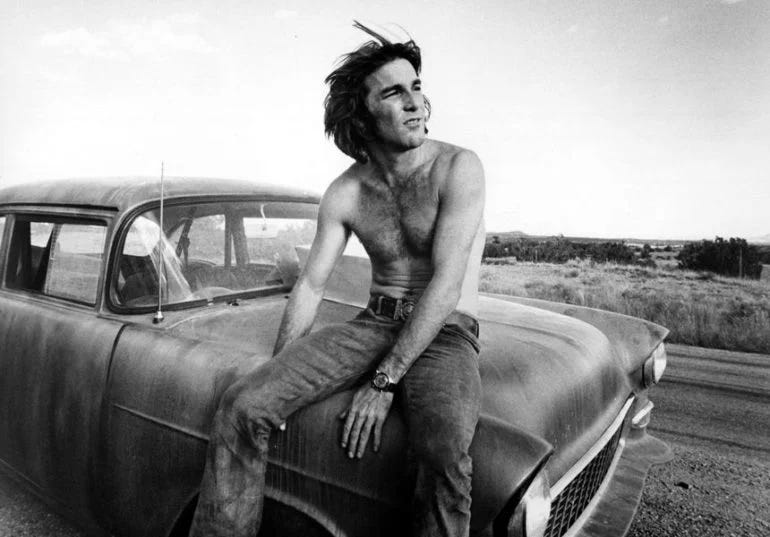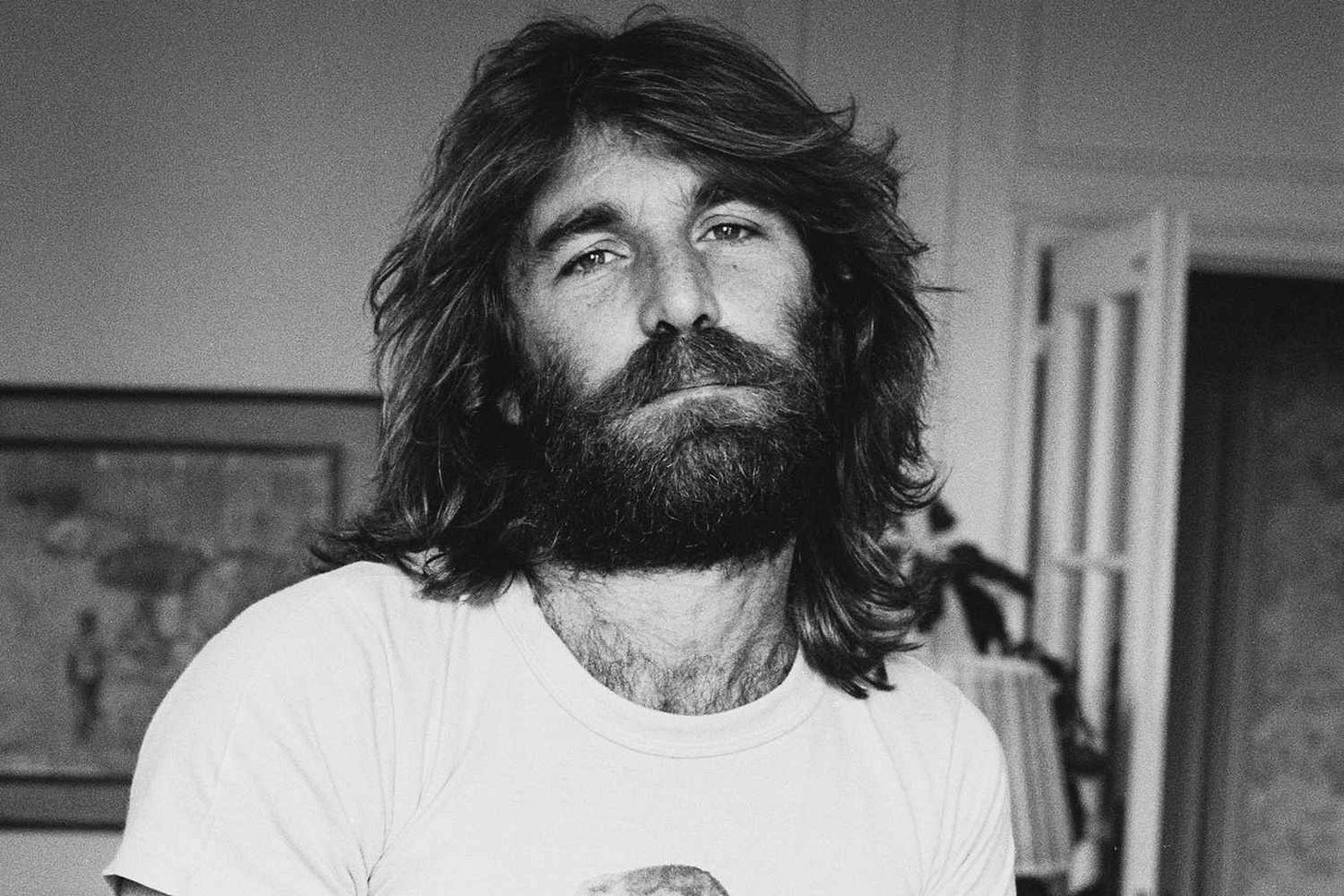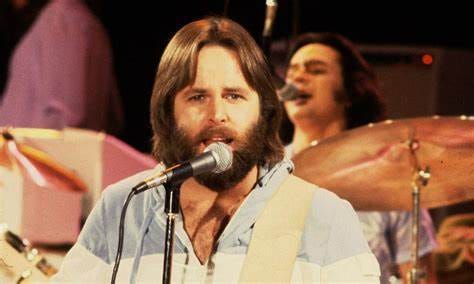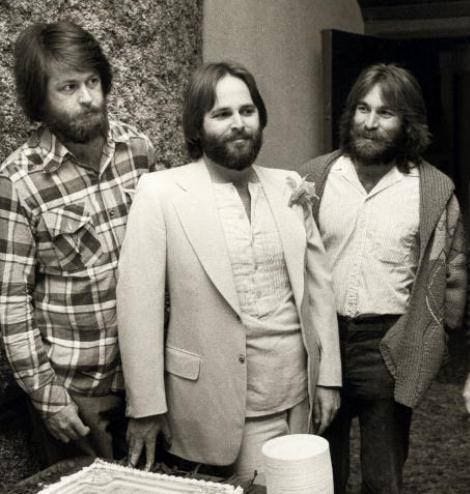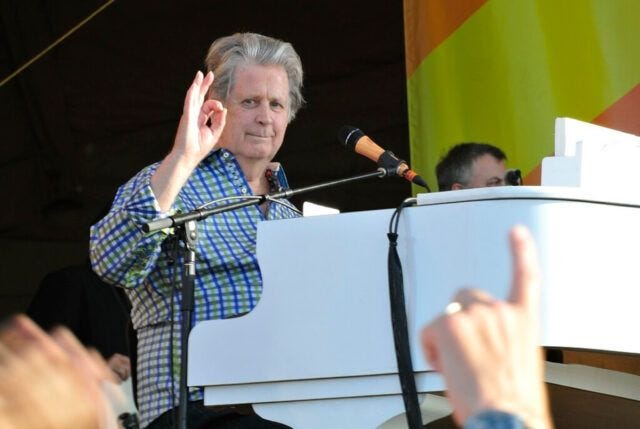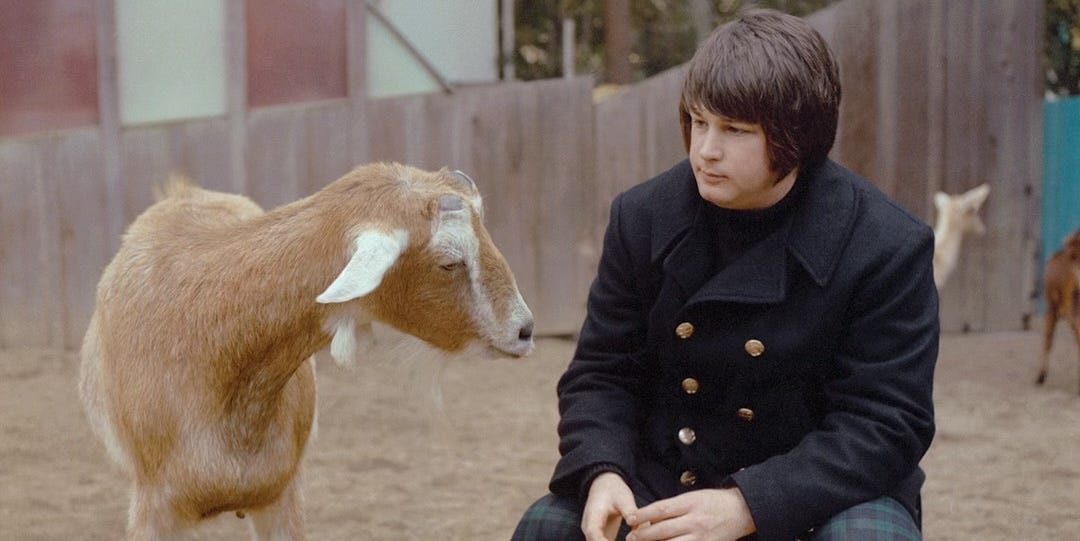Pictured: Carl Wilson (left), Dennis Wilson (middle), Brian Wilson (right).
Not many artists can claim to have defined an era, and fewer can claim they changed the landscape of music as a whole. Those who can would be The Beach Boys. With their unique harmonies and complex arrangements, they paved the way for present day music by reinventing the traditional pop song. They inspired their contemporaries from the likes of The Beatles, Bruce Springsteen, Elton John, to more genre opposing acts such as The Ramones, Weezer, and even Daft Punk.
The Beach Boys as a whole is arguably more complicated and more of a task than summarising The Cold War, but I wish to summarise the lives and impact of 3 members of the group: Dennis (the drummer), Carl (the lead guitarist), and Brian (bassist, producer and songwriter) – The Wilson Brothers. These 3 members were the heart, soul, and mind of the band, and with Brian’s recent passing, I feel it is right to express the brothers’ history, and their importance and need to honour their legacy.
Dennis Wilson – The Forever Favourite
Dennis Wilson, the middle child of the Wilson brothers, was born on December 4th 1944. Much like his brothers, he had a troubled childhood and upbringing, with their father, a pseudo successful musician, being verbally and physically abusive, and with Dennis being a natural rebel with high amounts of energy, he received the most abuse from his dad. Despite the abuse, the Wilson family was surrounded and united by music, much to Dennis’ dismay, who would prefer to be surrounded by cars, surfboards, and women. Although Dennis preferred not to sing, his mother persisted that he would join Brian and Carl’s new band, and took up the drums as a tool to channel his frustrations and energy into the distinct surfing sound. The subject of surfing, cars and women was a topic that Dennis himself suggested, with him being the only member of the band who was involved in the California Beach scene.
Providing Brian (the lead songwriter) with the outlet and theme to create music under, The Beach Boys achieved critical and commercial success from 1962-1966, with Dennis’ drumming embodying the lyrics and amassing a cult following with teenage fans. Because of the band’s success, Dennis had the funds necessary to pursue his rebellious and energetic personality, spending his earnings on luxury vehicles, houses, and parties, and thus copious amounts of alcohol, cigarettes, and later LSD, cocaine and heroine. It was this lifestyle that led to him befriending in 1968, the soon-to-be serial killer Charles Manson, who used Dennis’ earnings, and his house, to provide sanctuary for his cult and to boost his music career. It wasn’t until Dennis witnessed Manson’s darker side, an example being the threat to murder his child, to where Dennis attempted to escape Manson’s cult by moving homes so that the Manson Family could be evicted by an unpaid lease. Although he managed to escape the cult, it was clear that he took partial responsibility for the subsequent Manson murders, further spiralling him down an inescapable path of debauchery and self destruction.
Dennis would spend the rest of his life being constantly kicked out of The Beach Boys due to poor behaviour catalysed by his addictions, and with the band itself garnering a smaller salary to what they once did in the 1960’s as a result of their decline in popularity, Dennis would have no option but to sell his belongings to fuel his dangerous lifestyle. With him constantly being on the move, he had 4 wives within his lifetime, all of which faced issues with his behaviour. After selling the yacht he lived in, he tasked himself the mission to drunkenly retrieve the thrown overboard belongings of his ex-wife by diving under the bottom of the harbour that the yacht was previously located in. On December 28th 1983, Dennis was found dead at the bottom of the harbour.
The death of Dennis Wilson was nothing short of a tragedy. He lived a life of instability and constant movement, but despite the pain it brought him, he was unapologetically himself. This was evident to his lyrical, vocal and producing contributions to the group within the late 60’s until the late 70’s, with songs such as ‘Be Still’ (Friends, 1968), ‘Forever’ (Sunflower, 1970), and ‘Only With You’ (Holland, 1973), showcasing Dennis’ unfiltered and emotional romanticism, balanced with songs that also captured his rock and roll rebellious nature such as ‘All I Want To Do’ (20/20, 1969), ‘It’s About Time’, (Sunflower, 1970), and ‘Sound Of Free’, (single, 1970). Because of Dennis’ authenticity, the Beach Boys found a new form of admiration with fans and critics, paving the Wilson brother to be a shining star in his own right.
Not only this, but Dennis also created the critically acclaimed solo album Pacific Ocean Blue in 1977. This album was Dennis showcasing his talents shown within The Beach Boys, and is a must listen amongst many music critics, with the standout tracks being ‘The River Song’, ‘You and I’, ‘Time’ and ‘Pacific Ocean Blues’. Despite the album outperforming The Beach Boys’ contemporary works, Dennis felt the album was not a success critically or commercially, because of this, as well as his increase of studio unprofessionalism, the tour to promote the album, and the planned follow up album Bambu, was scrapped until the unfinished album was released to the public in 2008.
This to me showcases who Dennis truly was, he was a man who blindly followed love to wherever it led him, and because of his dedication to love, he hoped to have received the same love back. It is why he joined The Beach Boys in the first place, he didn’t do it for the love of music, he did it for the love of his brothers, and the love others felt towards the music they created, and thus the love he received from his fans. Although his search for love led to dark paths, Dennis Wilson will always be remembered for his individuality, his truthfulness to himself, and his heart, something of which that cannot be replicated by any other musician.
Carl Wilson – The Beach Boy Darlin’
Carl Wilson, the youngest of the Wilson brothers, was born on 21st December, 1946. His childhood was abusive much like his brothers, although it is debated that he may had been the least subjected to his father’s beatings, due to his kindhearted nature and lack of interest in rebelling, as well as being protected by his older brothers. Through the mentoring of his oldest brother, Brian, he was taught how to sing and harmonise the vocals of traditional pop songs, and, on top of gaining inspiration from rock and roll legends such as Chuck Berry, Carl, at age 12, took guitar lessons with neighbour, and temporary Beach Boy, David Marks. This propelled him to become The Beach Boys’ lead guitarist at the age of 15, and throughout the early stages of band’s career, Carl would be responsible for the guitar solos that defined the California surfing sound.
Despite this, Carl had little to no contribution towards the creative decisions within the music, and instead, much like his childhood, he would follow the instructions and advice given to him by Brian on how to play and how to harmonise. This was not to say he was dissatisfied with his inability to creatively contribute, but in fact Carl felt happy to work and perform under his brother’s leadership. However, when Brian began to stop touring with the group in 1965, the band was in need of a new frontman, to which Carl stepped up to fill Brian’s shoes, directing the band on tour as well as taking lead vocals. From 1965-1966, we see Carl emerge into the spotlight as Brian’s successor, performing lead vocals to the critically acclaimed single ‘God Only Knows’ (Pet Sounds, 1966) with some of the greatest vocal performances ever put on a song.
Carl’s contributions towards the group would later grow after Brian slowly began to contribute less and less to songwriting. With the band’s sole producer, songwriter and singer stepping down after 5 years, the band was in sheer panic, but Carl stepped up to the challenge, becoming a key producer and lead vocalist for the band. This was shown in the 1967 album Wild Honey, a lo-fi, R&B pop album that debuted a collective effort from each band member, with Carl performing and producing the majority of the album, including the hit single ‘Darlin’ and the title track ‘Wild Honey’. This then on displayed a clear passing of the torch from Brian to Carl, and now that Carl had grown as a musician, he had the responsibility to continue the band with the lessons that Brian had taught him.
After Brian stepped down as the leader of The Beach Boys, Carl Wilson would be the glue that kept the band together. If one of the bandmates had a song they wanted to work on, usually being a song by Brian, Carl would be the one who would often perform vocals for the track and produce it, and regardless of the song’s quality, Carl would never underperform. This is an example of Carl’s compassionate nature, a man who used his keen ears as a producer, and angelic voice, to elevate others and to bring out the best out of every member, all while never developing an ego for his gifts. With his contributions to the band being songs such as ‘I Can Hear Music’ (20/20, 1969), ‘Our Sweet Love’, (Sunflower 1970), to his exceptional writing credits for ‘Long Promised Road’ (Surf’s Up, 1971) and ‘The Trader’ (Holland, 1973), Carl Wilson led The Beach Boys towards experimental and genre bending songwriting, abandoning their surfer image and receiving praise as a genuine 70’s rock band. Carl himself would also experiment with disco and R&B within his solo career, with songs like ‘Heaven’ (Carl Wilson, 1981) and ‘What You Do To Me’ (Youngbloods, 1983), putting further emphasis on Carl’s natural singing talents, as well as delving into adult contemporary music with Gerry Beckley from the band America, and Robert Lamm from the band Chicago, in his posthumous collaborative album Like A Brother in 2000.
Pictured: Brian Wilson (left), Carl Wilson (centre), Dennis Wilson (right).
Despite the band’s constant ups and downs, and the quarrels between them, Carl would be the one trying to bring people together, and because of this, he would keep the band unified and touring until his death on February 6th 1998. Even when suffering from lung cancer, he was still touring with the band, and still performed like it was 1966. That was just the type of guy that Carl was, he would never intentionally let anyone down, whether it be his brothers, or his fans, and would make the most out of a bad situation. Even in their most embarrassing eras within the 80’s and 90’s, Carl brought his A game to any tour, any album, any song, elevating everything he touched into something angelic and beautiful – he had the Midas touch for music.
Carl would especially be there for Brian, much like how Brian was there for him when they were younger. Throughout Brian’s life, he faced numerous mental health problems, lessoned thanks to Carl, who would carry Brian’s responsibilities as a musician, and temporarily manage his wealth to ensure it was going towards the help Brian needed. Even in the 1990’s Carl would spend the last decade of his life fighting for Brian’s independence and for the right treatment for his mental struggles.
Carl Wilson should be remembered as the selfless Beach Boy who dedicated his life to supporting his family through every step of their lives, all the way up until his life ended. Although often put in Brian’s shadow, Carl never took it as a reflection of his lack of worth, but rather the opportunity to elevate his older brother into being the genius he believed him to be, and thus he elevated The Beach Boys. His contributions and dedication to the band has been somewhat overlooked, so therefore I hope to have shed light onto Carl’s contributions to the band, hoping that he receives the recognition he deserves as being the one responsible for some of The Beach Boys’ greatest feats.
Brian Wilson – The Man who brought The Warmth of the Sun
And now we get to talk about the oldest Wilson brother, Brian. Born on 20th June 1942, Brian always had a fascination with music. As a teenager, he would ditch baseball practice to listen and analyse popular doo-wop tracks and artists, specifically those by The Four Freshman, learning the harmonies and teaching them to his brothers within the confines of their bedroom. Brian’s father would feel the most joy when the Wilson brothers sang to him, and would manage the band up until the band fired him in 1964. He would also be responsible for Brian’s desire for perfectionism, as he would belittle and mock Brian and his bandmates if they would sing out of key. This belittlement and the physical and mental strain from his father would continue to haunt Brian, consistently questioning himself and his own talents throughout his career.
His knock in confidence, on top of a strenuous schedule from the constant touring, and writing, producing and performing 7 albums in a span of 3 years, led to Brian suffering a panic attack on a touring plane in 1964, resulting in his departure from performing with the band live. Although a tragedy within the band, it was an opportunity for Brian to escape the confines of surfer music and begin to experiment in the studio on more mature themes, much like the band’s competitors that stemmed from the British Invasion. Despite Brian creating fantastic work prior to his departure from touring, examples being ‘Don’t Worry Baby’ (Shut Down Volume 2, 1964), ‘In My Room’ and ‘Surfer Girl’ (Surfer Girl, 1963), The Beach Boys’ early albums lacked a consistent quality, and because of this, Brian wanted to create something true to himself that reflected his fears, his longing for nostalgia and love, with complex arrangements and revolutionary production. This album was released in 1966 under the name Pet Sounds, and although the album originally underperformed, it was labelled a masterpiece by critics and contemporaries, labelling Brian Wilson to be a 20th century Mozart. The album itself featured themes of naïve teenage romance shown through songs such as ‘Wouldn’t It Be Nice’ and ‘I’m Waiting For The Day’ (Pet Sounds, 1966), mixed with themes of a crushing reality full of change and isolation shown through the songs ‘Caroline, No’ and ‘I Just Wasn’t Made For These Times’ (Pet Sounds, 1966) respectively.
Brian had now reached his goal to make a pop music masterpiece, and with the release of the single ‘Good Vibrations’ (Smiley Smile, 1967), he seemed unstoppable, but regardless, he wished to outdo himself. The Beatles were heavily influenced by Pet Sounds, and Brian too was inspired by their 1965 album Rubber Soul, and because of this, both bands were at an arms race to create the album that would define the 1960’s. This led to Brian’s insecurities getting the better of him because of the pressure he faced from this challenge, and due to a consistently higher production budget, disagreements with his bandmates, and an increased consumption of LSD, he abandoned his ‘teenage symphony to God’ album known as Smile. This led to a lo-fi experimental version of the album being released labelled as Smiley Smile in 1967, an album of which was made in Brian’s home studio. The release of the album puzzled critics and audiences, who expected a successor to Pet Sounds, and when The Beatles released Sgt. Peppers Lonely Hearts Club Band that same year, Brian felt that his opportunity to make the definitive 60’s album was over.
Wilson would release the single ‘Heroes and Villains’ (Smiley Smile, 1967), a complete song from the Smile album, prior to Smiley Smile’s release, as a means to showcase the unfinished album’s intended sound, but this further alienated audiences and critics as a result of its complex arrangements and confusing lyrics. With both versions of Smile being rejected by the world, Brian no longer wanted his name solely synonymous with future albums and the potential criticism it could receive, leading to more involvement from other members of The Beach Boys to write, sing and produce, with remnants of Smile being scattered across the band’s discography, such as the songs ‘Cabinessence’ (20/20, 1969), ‘Cool, Cool Water’ (Sunflower, 1970), and ‘Surf’s Up’ (Surf’s Up, 1971). Despite this, Brian wanted to experiment with this new lo-fi sound, and in an attempt to bring back his confidence, he produced and wrote the majority of the simple, yet effective album, Friends in 1968, and although it is deemed as another Wilson masterpiece by today’s critics, with songs ‘Wake The World’, ‘Be Here In The Mornin’ and the title track being musical standouts, it merely peaked at 126 in the US billboard 200, the worst placement for any Beach Boys album at that point.
The negative reception towards Friends was the last straw for Brian, and from then on, he contributed little to The Beach Boys’ discography, writing a handful of songs or merely contributing to background vocals as he sought out psychiatric attention. The band was using Brian’s home studio in order to encourage him to work, but this clearly wasn’t as effective as they had hoped, and with Brian’s little contributions, on top of critical outcry for Smile’s release, interest for the band quickly plummeted, with demand for Brian’s masterpiece constantly haunting the band that they could not escape from. As the band began to decline financially and critically, so did Brian, consuming more food, alcohol and cocaine, contributing less and less, and developing suicidal thoughts, and with his father selling The Beach Boys’ music catalogue, it further enforced Wilson’s feeling of worthlessness, spending most of his days in bed.
It is hyperbolised that Brian spent years in his bedroom, and although it isn’t too far from the truth, he still contributed to the band, albeit to a lesser extent than what he once did, but when he heard the studio recordings from his bedroom, he would come down and provide input that elevated the song, penning the optimistic ‘This Whole World’ (Sunflower, 1970), and the existential ‘Till I Die’ (Surf’s Up, 1971). Brian would also reluctantly perform live with the band on select concerts when it was necessary, and went to Holland with the band, and created the fairy tale EP Mount Vernon and Fairway in 1973. Despite this however, Brian was still a self-destructing recluse, and the death of his father in 1973 was another factor towards that, donning pyjamas and slippers to parties where he would overindulge in all kinds of substances.
In 1974, a collection of songs from The Beach Boys’ early surf period was released as a compilation album titled Endless Summer, to which, as a complete surprise from everyone, went platinum in sales, catapulting The Beach Boys back into the mainstream. To commemorate the occasion, and due to Brian becoming more stable from the help of his newly appointed psychiatrist Eugene Landy, the band hatched the ‘Brian’s Back’ campaign, bringing Brian back to touring, producing and writing for the band as the creative lead, in the hopes to capture their success from the early 60’s. What resulted was the 1976 album 15 Big Ones, a mix of new Beach Boys songs and covers under Brian’s request, it was met with lukewarm critical reception, but led to commercial success the likes of which they had not received since 1965.
Pictured: Brian Wilson (left), Eugene Landy (right).
Brian was well and truly back, and the creative juices began to flow. Suddenly, Brian began to write a plethora of songs with themes of heartache, nostalgia, and being in love in your 30’s, a quality of which that could only be compared to Pet Sounds. Based on the sheer quality of the songs, the band allowed Brian to produce and write this new album, with themselves aiding in vocals, the result was the 1977 album The Beach Boys Love You. To say this album was the long-awaited sequel to Pet Sounds that people hoped would be a lie. As time progressed, so did Brian, and with his brain and voice damaged from the decade of consuming drugs and alcohol, the result was a rough, synth heavy, and bizarre experience, confusing fans and critics alike with lyrical content focusing on planets, Johnny Carson, and the infantilisation of a loved one. Despite the criticism, The Beach Boys Love You is labelled as another Wilson masterpiece and the last great album from The Beach Boys, with its pioneering in synth pop techniques, and the honest display of Brian’s broken mentality with its childlike, yet captivating, perception of the world, contrasted by its gravelly middle aged vocals, with the songs ‘Mona’, The Night Was So Young’ and ‘I’ll Bet He’s Nice’ being the best of examples of this.
A follow up album by Brian was in near completion which would continue the themes of Love You, with an emphasis on life mixed with the sound similar to a synthesised Sinatra, but initial reception of Love You led to the band’s steep decline into a nostalgia act, cancelling the then labelled Adult/Child album in favour of familiar and safe yacht rock music that also had little to no success. Brian would begin to relapse back to the person he once was in the early 70’s, contributing little to the band, becoming more dependant on cocaine, growing more violent, and because of that, he put his wife and children at risk, leading to his divorce from his first wife, Marilyn, in 1979.
The Beach Boys had psychiatrist Eugene Landy return, after initially being fired for his extortionate pay rise, in order to get Brian back to normality before he succumbed to his addictions much like his brother Dennis. His methods grew almost parasitical, with him and his guards taking refuge in Wilson’s estate, controlling his schedule and eating habits 24/7, and Landy himself becoming Brian’s manager and music collaborator for Brian’s debut self titled solo album in 1988. Although authentically Brian, with the standout song from the album being the angelic call for love, ‘Love and Mercy’ (Brian Wilson, 1988), the music was overshadowed by Landy’s involvement in Brian’s work and business, and with Landy controlling who Brian saw, including his family, friends and bandmates, Landy was assured to have full control of Wilson and his wealth. It wasn’t until the early 90’s when Brian’s physical state appeared close to vegetative as a result of too many prescribed antipsychotics, a state of which was able to be informed by his younger brother Carl Wilson, who learnt of Landy’s abusive methods, giving him enough ammunition to go to court and fight to sever Brian from him.
Pictured: Brian Wilson (centre) marrying Melinda Ledbetter (centre) in 1995.
Once Brian escaped Landy, he rekindled his love to a car saleswoman, Melinda Ledbetter, who began a romantic interest with each other but was initially intervened by Landy. They married in 1995, with Carl as Brian’s best man, and from then on, Melinda would manage Brian and ensure he received the proper medical attention he needed. Brian would make a full recovery, releasing a slew of acclaimed albums from 1995-2021, including going back to and finishing the album Smile, labelled and released in 2004 as the Grammy winning, platinum album Brian Wilson Presents Smile. Brian would also form ‘The Brian Wilson Band’, who he would tour and perform with for decades, and even reunited with the remaining Beach Boys for the 50th anniversary album That’s Why God Made The Radio in 2012.
Brian, despite being happier than he ever was under Landy’s regime, still had levels of protection from people and events that may upset him, sheltering him and still not receiving total control within his life, questioning the ethical implications of his conservatorship. Touring for Brian ended in 2022 due to health concerns, as he began to develop symptoms of dementia. His wife would then later pass away in 2024, with Brian following suite, passing away in his sleep on June 11th 2025. In his final moments, he would spend his time resting whilst his family, friends, and bandmates would visit to sing for him.
What I have tried to do here is merely an over simplified retelling of the grand life that Brian lived. His life was filled with fear, danger, threat, and loneliness, yet despite that, he overcame it all whilst wearing his struggles on his sleeve. Brian managed to surpass the abuse from his father, from Landy, and from himself, creating along the path, some of the greatest music ever composed. His ballads and pop songs captured his authenticity and honesty, sparking untouched parts of people’s souls, accepting one person’s fears and juxtaposing it with optimism, a sonic ying and yang that we as individuals struggle to balance in our day-to-day lives. With Brian passing at the age of 82, his life is a memento to this struggle, proving that, although our problems are constant and never ending, it never means we must succumb to it, that there are other sides to living, there is love, there is harmony, there is music. Because of this, it is essential that Brian Wilson must be remembered for generations to come as a man of strength, sincerity, and one of music’s greatest composers.
Originally, I had not intended this article to be as wordy as it became. Based on this article, it may be clear to you that I am one of many who were affected by Brian’s passing, and what would have been his 83rd birthday not too long ago, it compelled me to listen to their discography again. Upon Brian’s death, I approached my record player and played Pet Sounds from beginning to end, lying down and staring at the ceiling with the lights off, reflecting how he and his brothers impacted my outlook on the world, with ‘God Only Knows’ in particular being the anthem to me and my girlfriend’s love for each other and the song we intend to play at our wedding. Despite my attempts, the Wilson brothers' impact on me as a person, and the world around me, cannot be put to justice through words alone, so I advise you, if willing to, to seek out The Beach Boys’ discography and immerse yourself in their harmonious sound.
Below will be a guide of albums to listen to for those interested, as a means to separate the good from some of the bad. Although the song recommendations I have made throughout this article would also be a great way to explore the brothers’ music, it would be a disservice to not delve further into their rich albums. I wish everyone who has read this far a fantastic day, and I hope you have gained insight, intrigue, and possible motivation from the Wilson brothers’ story. For more music-based articles, please subscribe and feel free to comment and discuss any other artists that resonate with you. I would love to hear what others may recommend, and to hear your stories surrounding your attachment towards them.
Pictured: Brian Wilson (centre foreground), Carl Wilson (centre background), Dennis Wilson (right).
For those looking for classic Beach Boys surfer music:
Surfer Girl [1963]
All Summer Long [1964]
Summer Days (And Summer Nights) [1965]
For those looking for Brian centric albums:
The Beach Boys Today! [1965]
Pet Sounds [1966]
Friends [1968]
Love You [1977]
Adult/Child [unreleased] (accessible online)
For those looking for more of a group effort with songs by Carl and Dennis:
Wild Honey [1967]
20/20 [1969]
Sunflower [1970]
Surf’s Up [1971]
Holland [1973]
For those who want to want to listen to the Wilson brothers’ solo albums:
Brian Wilson - Brian Wilson Presents Smile [2004]
Carl Wilson – Like A Brother [2000] (under the band Beckley Lamm Wilson)
Dennis Wilson – Pacific Ocean Blue [1977]
For those who aren’t fussed and just want an overall summary of the band’s best work:
The Very Best Of The Beach Boys: Sounds of Summer (Expanded Edition Super Deluxe) [2022]






